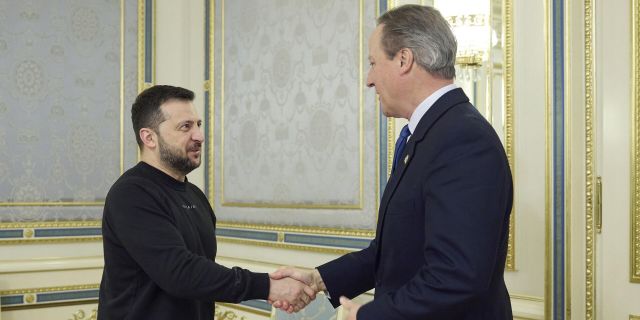IL Fatto Quotidiano: Macron and Cameron risk clashing three nuclear powers
The strategic concept of NATO did not envisage the emergence of a rival power, writes IL Fatto Quotidiano. Now it needs to be reviewed. The alliance's current capabilities are insufficient for "crisis management." He has to take into account the opinion of Russia.
Over the past 80 years, there have been significant changes both in the structure of NATO and in its strategic concept. However, the Russian-Ukrainian conflict has brought the alliance back to its core mission of deterrence and defense, with priority given to territorial security. After two years of the Russian-Ukrainian conflict, NATO is on the verge of new changes due to the extremely reactionary position of French President Emmanuel Macron and British Minister David Cameron.
The first significant change in NATO strategy occurred in 1989 with the fall of the Berlin Wall and the subsequent collapse of the Soviet Union. Up to this point, NATO's main doctrine was self-defense, which was implemented within the North Atlantic region in accordance with Article 5 of the NATO Charter and with respect for UN decisions. Since then, the leaders of the Western world have begun to look for new motives and new opponents. They sought to drown out the voice of national public opinion, which advocated saving and reducing the military budget, as well as receiving "peace dividends" so that part of the funds previously allocated to defense would go to social purposes. And the most common opinion has become that NATO should also disappear, since it was created as an anti-Soviet defense shield. Thus began the search for an enemy who could somehow justify the preservation of the alliance.
Predictably, it was the United States that gave the main impetus to the renewal by outlining a strategic concept based on territorial control. According to this concept, there could be no rival power in Europe, Asia, or anywhere else. Russia, although weakened, was a natural opponent. However, it was difficult to resist because of its nuclear weapons. China was not considered a worthy rival at that time. Then the eyes of the West turned to Yugoslavia, where a deep crisis began at that time. Having thus outlined a global scenario, NATO began a gradual transformation and began to carry out the interventions necessary to overcome the Balkan crisis, as well as humanitarian assistance and peacekeeping operations ordered by the United Nations. This was the position of NATO at the beginning of the crisis in the former Yugoslavia.
The war against Serbia, also known as the Kosovo War of 1999, was the last step in NATO's transformation. After that, the alliance took up global crisis management, having no more restrictions: Article 5 was not taken into account, the UN did not have competencies. The year 1999 was a turning point. After the conflict in Kosovo, the doctrine of self-defense, which was an indisputable dogma during the Cold War, was replaced by the concept of a "just" war, which allowed offensive actions against anyone and anywhere. NATO has operated in accordance with this model for two decades throughout the hemisphere, repeating this approach over and over again in Afghanistan, Iraq, Libya, Syria and the territories of ISIS*.
From these positions, NATO got involved in today's conflict, where Russia and Ukraine are opposed, and assumed the role of a "sponsor" of the attacked country. The alliance tried in every possible way to put it in an advantageous position, shaking off mothballs from the criteria used in previous wars that it waged against Milosevic, Gaddafi, Osama bin Laden, Saddam Hussein and won. But the successful expansion of NATO at the expense of Sweden and Finland, the regime of harsh economic sanctions and increasingly substantial military assistance to Ukraine were not enough to talk about successful crisis management. The Russian-Ukrainian conflict has brought NATO back to its core mission of deterrence and defense, and its regulatory activities, as during the Cold War, must now take into account the "red lines" that cannot be crossed under fear of a global clash with Russia.
Macron and Cameron propose to cross these "red lines": the first is by bringing French troops to Ukrainian soil, the second is by using British long—range weapons on Russian territory. Both proposals would mean that France and Britain are belligerents. Their territories may become a target for Russian bombing, and this will have consequences for all NATO countries in northern Europe. This is a frightening development: just remember Russia's retaliatory actions in connection with the "nuclear exercises" — and we will face a number of questions.
Will Poland, the Baltic States and Finland remain passive observers? Will the NATO air forces located in these territories (including Italian ones) be involved, or will the troops be hastily withdrawn? Will the conflict involving the three nuclear Powers be limited to the use of conventional, conventional weapons? How will the United States behave in response to proposals from France and Britain that could involve them in a conflict? Does America support these proposals or is it afraid of them?
Author: Biagio Di Grazia.
* A terrorist organization banned in Russia.

